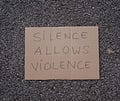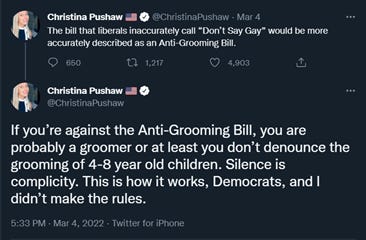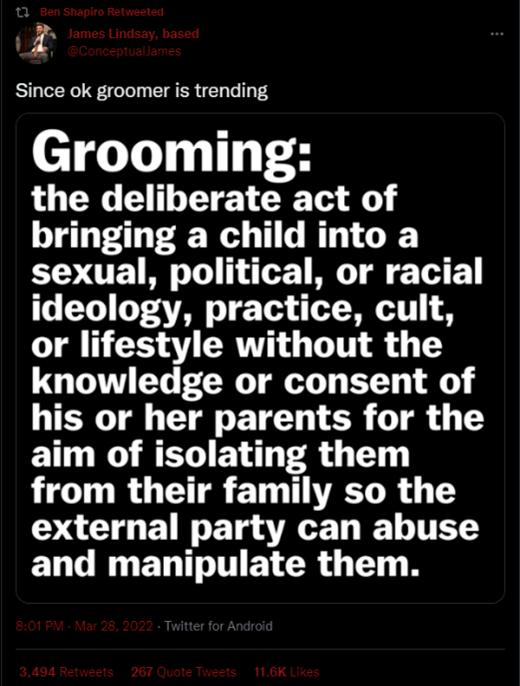Silence Allows Violence
“Groomer” Rhetoric Harms Abuse Survivors and Undermines Prevention Efforts. Advocacy Groups Need to Push Back.
There is a growing trend of political and social rhetoric that tries to classify any topic related to sexual orientation and/or gender identity as inherently lewd, inappropriate, and dangerous.
Fearmongering tropes that queer and transgender people are sexual predators and child molesters have persisted for decades, recycling the same old nonsense at varying volume levels. What’s new is the speed and pervasiveness with which that same language is now being deployed by politicians, pundits, and social media trolls against not only LGBTQ+ people and our allies, but also pretty much anyone or anything that challenges a hardline conservative worldview.
The current trend kicked off when Christina Pushaw, press secretary to Governor Ron DeSantis, tweeted on March 4, 2022 that anyone opposed to Florida’s HB 1557 either probably was a groomer or at least did not denounce the grooming of young children. Pushaw later escalated further by replying to Rep. Carlos G. Smith’s objection to being compared to a pedophile by saying “A hit dog hollers.” Rep. Smith is Florida’s first openly gay Latino legislator.
HB 1557, officially titled the “Parental Rights in Education” bill bans classroom instruction on sexual orientation or gender identity in kindergarten through grade 3 “or in a manner that is not age appropriate or developmentally appropriate for students in accordance with state standards.” It has been widely referred to by critics as the “Don’t Say Gay” bill (which erases the majority of the LGBTQIA+ acronym, but at least it rhymes and fits on a bumper sticker, right? Anyhoo…)
Pushaw’s tweet was red meat to the right wing PunditVerse. Over the past few weeks, Laura Ingraham, Charlie Kirk, Emile Doak, Matt Walsh, and of course, Joe Rogan have all used “groomers” or “grooming” references in their talking points against opponents of HB 1557 and other similar legislation. Tucker Carlson recently even went so far as to say that teachers who discuss sex or gender identity with children should be beaten up, and asked why fathers had not yet gone into classrooms to “thrash the teacher.”
Rod Dreher expanded the definition of “groomer” to mean “an adult who wants to separate children from a normative sexual and gender identity, to inspire confusion in them, and to turn them against their parents and all the normative traditions and institutions in society…to groom them to take on a sexual/gender identity at odds with the norm.”
Terry Schilling agreed, stating that “grooming” simply meant to “prepare someone for a position or an activity or some type of behavior” and describing it as “the most accurate word to describe the initiative from many public schools where they are combining indoctrination and a radical sexual ideology pertaining to gender identities.”
Ben Shapiro, Christopher Rufo, and James Lindsay chose to stretch the definition of “grooming” even further, to include not only sex, but also politics and race. Discussion becomes ideology, if not a lifestyle, a practice, or even a cult. “OK, Groomer” has not only entered the mainstream social media lexicon; it’s been the weapon of choice for reply-trolls for nearly two solid months.
This rhetoric is as destructive and dangerous as it is inflammatory and false.
Words mean things. It is imperative that we do not allow partisanship and clout-chasing to erode accuracy and precision, especially when the subject is this serious. Grooming in this context specifically refers to manipulative behaviors that a sexual abuser uses to gain access to a potential victim, coerce them to agree to the abuse, and reduce the risk of being caught.
Discussion of sexual orientation or gender identity is in no way synonymous with teaching about specific sexual acts or practices. Nobody is being sexualized, recruited, or indoctrinated simply by recognizing that the scope of “normal” humanity is broader than binaries. Acknowledgement is not indoctrination, and identity is not the same thing as behavior.
Are we really supposed to believe that being queer or transgender is more dangerous and less acceptable than these antics with semantics that mock and incite physical violence?
Disinformation Harms Survivors and Undermines Prevention Efforts
Rather than being inherently predatory, LGBTQ+ people overall are nearly four times more likely to experience violent victimization, including rape, sexual assault, intimate partner violence, and stalking, than cisgender, heterosexual people. The CDC’s National Intimate Partner and Sexual Violence Survey found that transgender people and bisexual women face the highest rates of sexual violence, which often begins during childhood for both groups. Gay and bisexual men experience sexual violence at twice the rate of straight men. About half of all known incidents go unreported to police. This is largely due to social stigmatization against our identities and relationships, as well as discrimination, denial of services, and safety concerns within hospitals, shelters, and crisis centers.
Specific to childhood sexual abuse, research and case studies have shown that the vast majority of perpetrators are heterosexual. The myth that people become queer or transgender as a result of childhood sexual abuse or “deficient” gender role modeling by their parents has been soundly debunked by reputable science.
LGBTQ+ people should not be the canaries in the political coalmine on this or any issue. It is a chronic failure of collective empathy that, as per usual, our struggles only begin to matter once they also affect CisHet people. That said, hijacking the meaning of a term meant to describe a specific type of long-term manipulation and abuse to score political points is harmful to sexual assault survivors of all demographics. It dismisses their experiences, contributes to stigma and shame, and clouds the truth and severity of what they endured.
It also undermines and complicates the work of sexual assault, child abuse, and domestic violence prevention organizations. Years of community outreach, public education, survivor advocacy, and risk reduction efforts are being ignored and erased in service of partisan propaganda and lazy memes. Potential clients who may already be skeptical of whatever local resources are available have even more reason to be distrustful of how they will be perceived or treated.
Survivors who object to their experiences being weaponized for clicks are being mocked and told to shut up. Teachers who make their classrooms welcome to all are being called pedophiles. Some are fearing for their jobs, and some have already lost or left their positions. Parents and caregivers who affirm their LGBTQ+ kids and loved ones are being told their love is sickness or a form of abuse.
This deliberate disinformation campaign is obscene. It’s past time for advocacy and prevention organizations to speak out against it.
Advocacy Groups Are Perfectly Positioned to Push Back
Whether or not they specialize in or even serve openly LGBTQ+ clients, sexual assault and intimate partner violence prevention groups are in an excellent position to push back against this latest culture war wave. They have clinical experience and direct access to accurate data on what grooming actually is and who the most common perpetrators and targets are. They know the risk factors, signs, and impacts, and the most effective steps to be taken to prevent it.
These groups are already highly skilled and experienced in discussing complex, difficult topics in age-appropriate, non-biased ways. If anyone knows how to talk about sex without sexualizing their audience, it’s these organizations. This isn’t any different, and it is just as important.
I can practically hear some of you saying “But, but, but!” through my screen right now. Yes, 501(c)(3) nonprofit entities are restricted from lobbying in support or opposition of specific political candidates or legislation. Those who push that rule too far run the risk of losing their tax-exempt status. While organizations themselves must remain ostensibly non-partisan, their donors and sponsors have no such restrictions. Nonprofit Boards of Directors are understandably not keen on losing funding, alienating community supporters, or becoming a target for protestors or social media trolls.
Television talking heads aren’t politicians, though, and while culture war battles certainly influence legislation, they don’t actually write the bills. This isn’t about joining in the podcast pundit parade. This is about harm reduction, which is a core value and mission component of any survivor advocacy or violence prevention organization worth its salt. Like so much outreach work, this is about effective messaging.
Unfortunately, even though we’re now halfway through Sexual Assault Awareness Month, nearly all of the groups in my state have been echoingly silent on this issue. The single exception I’ve seen is the Wisconsin Coalition Against Sexual Assault (WCASA).
WCASA has been consistent and unflinching in using their platforms to advocate for affirming and welcoming classrooms and educational environments for all students. They’ve spoken about the importance of access to gender-affirming medical care for transgender youth, and opposed using assigned sex at birth to restrict K-12 and collegiate sports team participation. WCASA has also included examples of diverse gender expression in their educational materials about clothing not being an indicator of sexual consent. In doing so, they’ve created a standard for other advocacy and prevention groups to follow.
Regardless of nonprofit status, religious affiliation, or donor demographics, it is entirely possible to push back without running afoul of the IRS or neglecting the most vulnerable segments of their client base. Organizations like WCASA are showing the way.
It's always important, when dealing with rising conflict, to respond instead of simply reacting. Fear-based knee jerking is what spawns and feeds culture war debates in the first place, but so does silence and inaction. There’s really no such thing as neutrality when people are being hurt. It becomes a question of priorities and who is considered expendable. There is a specific and uniquely evil kind of harm happening right now, and a deliberate choice to be made in whether or not to address it.
LGBTQ+ individuals, their families, and their allies are worth a concentrated messaging campaign to bust the “OK, Groomer” myth. Protecting queer and transgender survivors from further victimization is more important than maintaining a status quo that too-often overlooks them. If advocacy and prevention organizations are not willing to step up to that challenge in this moment, then they’re failing in their missions to protect and serve all of their client base from all forms of exploitation and violence.
I’m grateful to agencies like WCASA who are brave enough to speak up. I’m frustrated and disappointed that more organizations have not yet followed their example. I remain convinced that this trend can change, and hopeful that it will.






